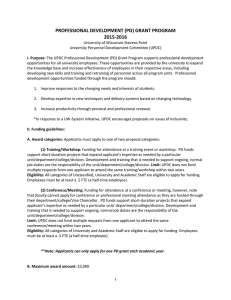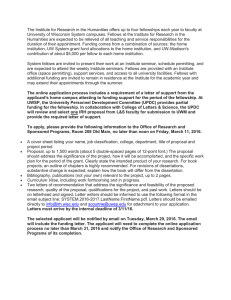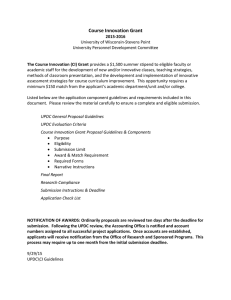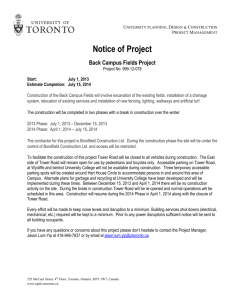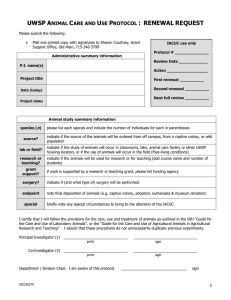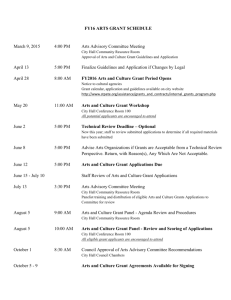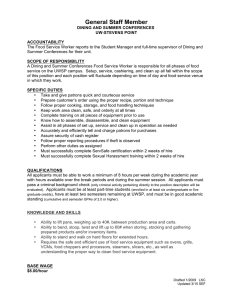General Grant Policies 2015-2016 University of Wisconsin-Stevens Point University Personnel Development Committee
advertisement
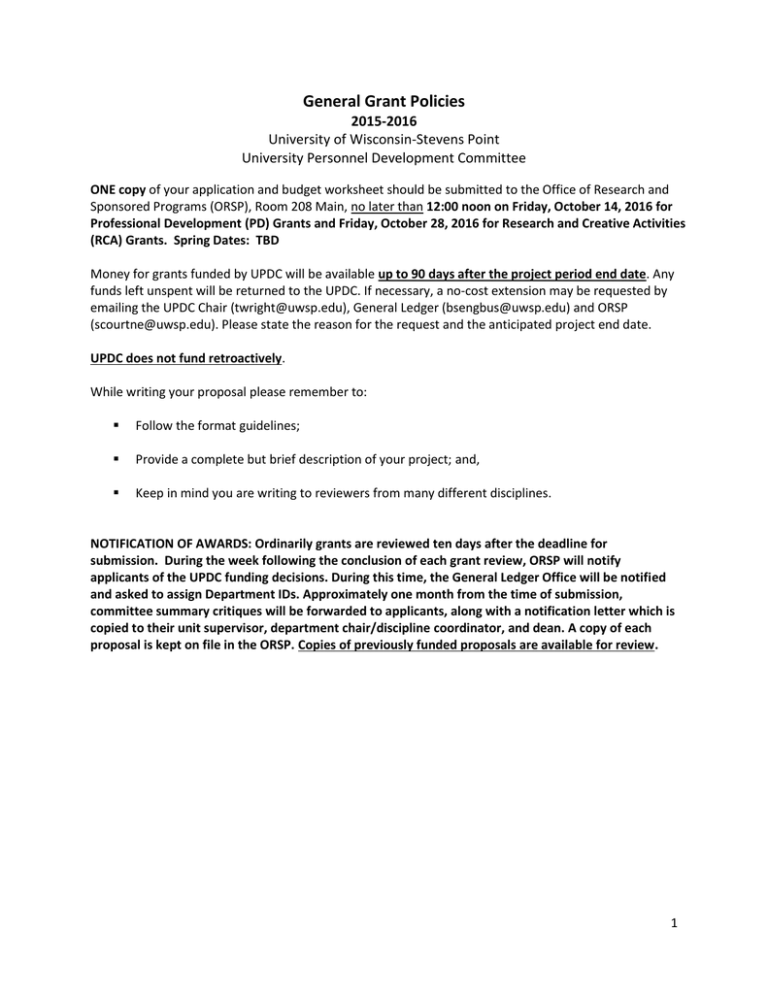
General Grant Policies 2015-2016 University of Wisconsin-Stevens Point University Personnel Development Committee ONE copy of your application and budget worksheet should be submitted to the Office of Research and Sponsored Programs (ORSP), Room 208 Main, no later than 12:00 noon on Friday, October 14, 2016 for Professional Development (PD) Grants and Friday, October 28, 2016 for Research and Creative Activities (RCA) Grants. Spring Dates: TBD Money for grants funded by UPDC will be available up to 90 days after the project period end date. Any funds left unspent will be returned to the UPDC. If necessary, a no-cost extension may be requested by emailing the UPDC Chair (twright@uwsp.edu), General Ledger (bsengbus@uwsp.edu) and ORSP (scourtne@uwsp.edu). Please state the reason for the request and the anticipated project end date. UPDC does not fund retroactively. While writing your proposal please remember to: Follow the format guidelines; Provide a complete but brief description of your project; and, Keep in mind you are writing to reviewers from many different disciplines. NOTIFICATION OF AWARDS: Ordinarily grants are reviewed ten days after the deadline for submission. During the week following the conclusion of each grant review, ORSP will notify applicants of the UPDC funding decisions. During this time, the General Ledger Office will be notified and asked to assign Department IDs. Approximately one month from the time of submission, committee summary critiques will be forwarded to applicants, along with a notification letter which is copied to their unit supervisor, department chair/discipline coordinator, and dean. A copy of each proposal is kept on file in the ORSP. Copies of previously funded proposals are available for review. 1 UNIVERSITY PERSONNEL DEVELOPMENT COMMITTEE Mission: To facilitate professional development activities of all members of the University community by (1) providing financial resources, and (2) helping to improve grant writing skills. The UPDC provides grant opportunities for faculty and staff to improve their professional skills or university programs. Grant proposals are evaluated and critiqued to provide constructive criticism and to aid in improving the grant writing skills of the proposer. A. GENERAL GUIDELINES FOR ALL GRANT PROPOSALS Eligibility and Limitations: All faculty, academic staff and university staff can apply for UPDC grants. There are two types of UPDC grants: Professional Development (PD) and Research and Creative Activities (RCA). Only one UPDC grant is allowed for each grant category (PD or RCA) per academic year and may not be for the same project. The maximum award is $7,500 for RCA grants and $3,000 for PD grants. If you have an active UPDC grant from the prior year, you may not apply for another grant within the same category (PD or RCA) until the final report is completed. If a past recipient of a UPDC grant does not submit a final report of their completed project, they are not eligible for any further UPDC grants until their project summary report is filed in the Office of Research and Sponsored Programs. UPDC does not fund travel for Faculty to attend conferences and professional meetings. UPDC will fund travel for research activities and training. Materials, Supplies and Equipment: Proposers who want to fund the purchase of books or non-print materials (e.g., instructional videotape, digital data) must consult with the collections development department of the University Library about the appropriateness of purchasing the materials and housing them in the LRC after the project is finished. Apparatus is defined as equipment specific to the project and not equipment commonly found in the department. Desktops, laptops and tablets are unallowable costs for all UPDC grant programs. All apparatus purchased from UPDC funds is considered to be the property of the University. Student Help: Students may be paid to help faculty and staff in their research projects. It must be clearly stated in the narrative that the faculty or staff member is responsible for the research and why the student help is essential to the project. For example, a student may be paid to assist with a research project, but funds will not be provided for a graduate assistantship stipend. If special talent or training is needed, a student should be named and qualifications stated. Students are not eligible to apply for UPDC grants. Salary Requests: Salary requests are carefully scrutinized by UPDC and must have strong justification. The Committee often chooses to eliminate part or all of salary requests due to budget constraints. Salary requests may not exceed $1,000 and must be matched by other University funds (e.g., department cost-sharing). Award of salary money for a summer project is contingent upon the applicant returning for the fall semester. Requests for salary money are viewed more favorably when the project involves work outside the normal duties of the applicant’s present position. For example, a request for salary to update course curriculum would normally be considered part of a 2 faculty’s regular duties and would likely not be granted. Conversely, a faculty member who is giving a workshop attended by other faculty would have a stronger case for salary since the workshop is not considered part of normal faculty duties. Publication Costs: Do not include anticipated publication costs in your proposal. The ORSP can provide a copy of the Publication Fund Application form. Previously Funded Projects: Generally, UPDC grants are seed money only. Continuation of a project previously funded by the Committee will normally be considered only if other sources of funding have been sought. In the case of a proposal being submitted to the Committee on a topic similar to one previously supported, it is the responsibility of the applicant to show the proposed project addresses a distinctly different dimension of the topic and/or the proposer has sought funding from external sources. Consult the ORSP for possible funding sources. Extramural Funding: Where appropriate, individuals receiving UPDC grant support should consider applying to extramural funding sources to supplement or add to the resources provided by the UPDC. State and Federal Regulation Compliance: Projects approved for funding must comply with the various State and Federal regulations, for example, regulations concerning research involving human subjects (IRB approval required), animal subjects (IACUC approval required), environmental impacts (WEPA), equipment purchased, and publishable or patentable materials. See Appendix A for IRB, IACUC, and WEPA information. Where IRB and IACUC protocol approvals are required, UPDC funding will be held until protocol approvals are documented. Employment at UWSP Following Grant Award: It is expected that faculty and staff will be employed by UWSP while using UPDC resources which are included in your budget. Any changes in the employment relationship with UWSP should be reported to the ORSP by grant recipients as soon as possible. Equipment acquired by UPDC grant money will remain the property of the University. Reporting Results of Previous Grants: If the applicant has received past UPDC grants, the grant application is required to include information concerning the results of these grants, e.g., papers presented, books/manuals published. Accountability (academic as well as fiscal) for resources allocated to previous grants will be considered in the evaluation of the current request. B. BUDGET DOCUMENTATION It is the responsibility of the applicant to ensure the proposed budget costs comply with University and State policies. Contact the appropriate personnel in Purchasing or Payment Services with questions. 1) Supplies/Equipment: Please include copies of formal quotes. When this is not possible the applicant should provide a brief statement indicating why. 2) Travel: All travel estimates must be supported by copies of estimates from the State authorized travel agent (TravelWise/Concur). Please include a copy of the UW TravelWIse calculator for Lodging Maximums & M&IE Per Diem Allowance Calculation. If you are driving, you must also include a print out of your trip via MapQuest (or similar program). 3) Workshop/Seminar: Please provide a copy of the brochure, URL, or other documentation of the event. 3 4) Personnel Costs: Estimating personnel costs (student or LTE) for projects should be done in conjunction with your departmental Program Associate or through a payroll and benefits specialist in UWSP Human Resources. 5) Cost Sharing: Applicants requesting funds for course tuition, training fees, or conference attendance (if eligible) must acquire a 10% monetary match from the university. 6) Course Tuition: Any course tuition request must include documentation from Human Resources indicating that all or some of the tuition may not be covered by the Tuition Reimbursement program. C. UPDC EVALUATION CRITERIA 1) The complete application must be submitted by the deadline date and time and in the format specified in the guidelines. Applications that are noncompliant will be reviewed and critiqued at the discretion of the Committee, but are ineligible for funding at that time. 2) Evaluation of the application will be based on the following criteria: a) Adherence to format guidelines; b) Accuracy and justification of budget; c) Clarity of the narrative. The information presented must be in a form that is easily understood by the layperson. Committee members may not be familiar with your specific discipline d) Value and benefit to the university and/or students; and, e) Letter(s) of support. Applicants are required to solicit recommendation /support letters from Unit Supervisors, Department Chairs, or Discipline Coordinators. If the project involves collaborative arrangements with outside entities, the application should include letters of support from the partner institutions, organizations, or individuals. Any questions regarding the General Grant Policies should be directed to the Office of Research and Sponsored Programs or the UPDC Chair. 4 Appendix A Institutional Review Board (IRB) for the Protection of Human Subjects All research involving human subjects must be approved by the IRB. The UPDC encourages applicants to obtain IRB approval prior to submitting their Research Grant. Applicants may obtain IRB approval after the grant is submitted, but funds for approved projects will not be released until IRB approval is obtained and documentation of approval is on file with the Office of Research and Sponsored Programs. Applicants can access additional information and relevant forms by visiting: http://www.uwsp.edu/acadaff/orsp/irb/Pages/default.aspx Institutional Animal Care and Use Committee (IACUC) All projects involving animals must be approved by IACUC. The UPDC encourages applicants to obtain IACUC approval prior to submitting their Research Grant. Applicants may obtain IACUC approval after the grant is submitted, but funds for approved projects will not be released until IACUC approval is obtained and documentation of approval is on file with the Office of Research and Sponsored Programs. Applicants can access additional information and relevant forms by visiting: http://www.uwsp.edu/iacuc/Pages/default.aspx Wisconsin Environmental Policy Act (WEPA) Certification: WEPA is a state law (see current s.1.11 Wisconsin Statutes and Chapter 274, Laws of 1971), which spells out the state’s environmental policy and requires state agencies to consider the environmental effects of their proposed actions. Research and development activities of state agencies are considered actions. DNR procedures for implementing WEPA are outlined in Chapter NR 150, Wisconsin Administrative Code. Environmental Health, and Safety Hazards If there are physical, chemical, biological hazards, any hazardous waste management, or radiation issues associated with your research, please contact the Environmental Health and Safety Officer at 346-2320. 5
